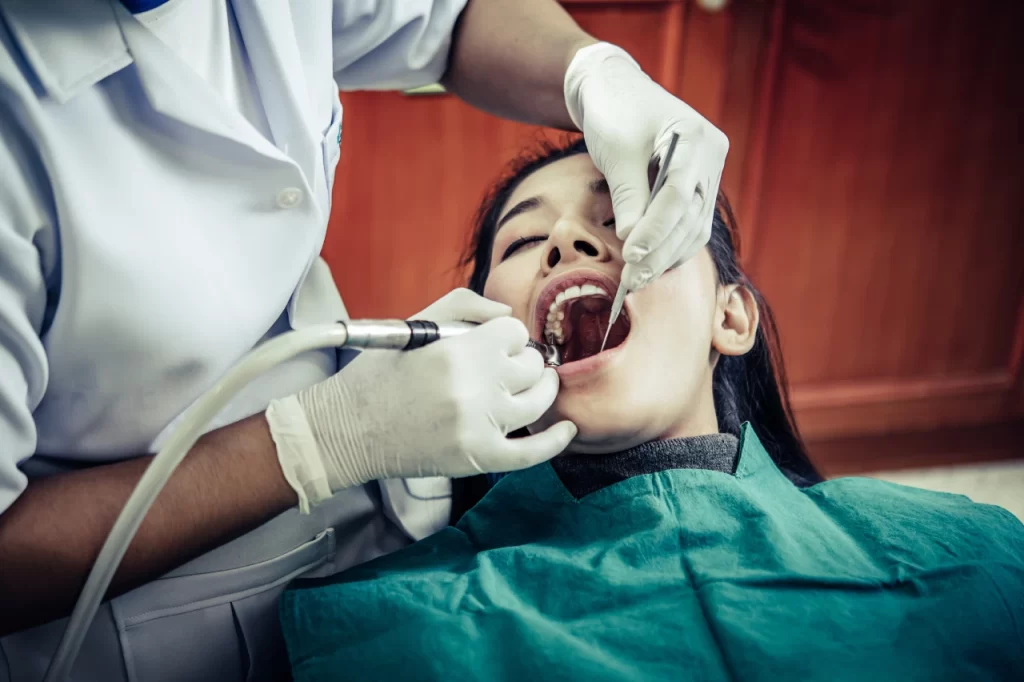
How you respond when something unexpected arises can determine whether it becomes a minor or serious issue. Unexpected situations could include toothaches that occur suddenly or accidents in which broken or knocked-out teeth require immediate treatment.
Staying calm can often be the key to keeping yourself from going over the edge.
1. Call Your Dentist
If you find yourself experiencing a dental emergency, the first thing to do is call your dentist. By informing them what’s happening and providing details such as contact info and office hours for them, they may advise on next steps or schedule an emergency appointment for you. Furthermore, it would be a good idea to put together a small emergency kit including items like gauze pads and over-the-counter pain relievers (like Ibuprofen) so you can treat any toothache or gum injury at home until able to visit them at their office.
If you experience a knocked-out tooth, it is vital that it be reinserted immediately as this could prevent further permanent damage and save further complications such as infection or blood loss. You can avoid dental emergencies by practicing good oral hygiene, wearing a mouthguard while playing sports and regularly visiting the dentist.
2. Go to the Hospital Emergency Room
Most dental emergencies can usually be handled within your dentist’s office; however, in cases involving serious discomfort and/or severe injuries to gums, lips, tongue, cheek or jaw bones it may be necessary to visit an emergency room right away.
Emergency Room doctors are trained to prescribe painkillers and antibiotics, but cannot repair damaged teeth or restore facial structures. Many times patients who visit an ER with dental issues lack dental insurance and missed routine care due to financial concerns.
Avoiding emergency rooms reduces strain on healthcare systems and is especially crucial during COVID-19’s pandemic, when emergency departments are already stretched thin. Furthermore, handling dental emergencies directly in dentist offices saves resources that could otherwise go towards helping those most in need.
3. Stay Calm
As soon as an emergency situation arises, the first thing to remember is to remain calm. Panicking can cloud judgment and interfere with problem-solving efforts; staying composed allows you to assess it objectively as well as determine if there’s anything you can do about an unexpected occurrence.
Remembering the unexpected can happen to anyone at any time can be challenging, even those who feel well-prepared. Also keep in mind that unexpected doesn’t always equal bad things happening; sometimes unexpected can bring unexpected advantages like receiving an unexpected promotion at work or finding great bargains on shoes!
When feeling overwhelmed, take a step back and consider all of the positive aspects of the situation. This can provide clarity and help you make more rational decisions in emergency situations.
4. Take Care of Your Gums
Most people understand that poor oral health can result in cavities, bad breath and tooth loss, but did you also know that gum disease can also pose more serious threats such as cardiovascular, respiratory and immune conditions? Therefore it is vitally important to maintain optimal gum health alongside caring for one’s teeth.
If you experience minor soft tissue injuries like gum cuts, salt water rinse or antiseptic mouthwash is the most appropriate treatment to slow bleeding and alleviate pain. Pressurize and apply ice packs as necessary.
If a tooth has been knocked out, attempt to reinsert it back into its socket as soon as possible – this may require repositioning – rinse gently with water, place in milk or another cell growth medium such as Save-A-Tooth and call your dentist as soon as possible for an appointment.







